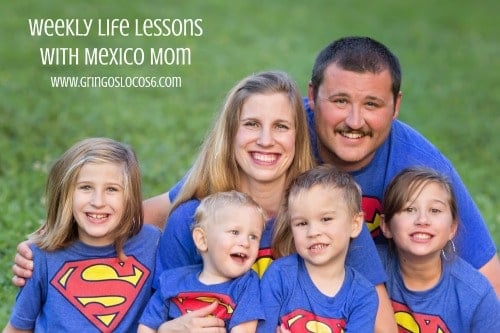
by Tina Marie Ernspiker | Jan 9, 2015 | 2015, Family, Health, Husband, International, Kids, Life Lesson, Living Abroad, Mexico, Motherhood, Parenting, World Motherhood

As a wife of one and a mom of four, it seems like I am always learning and discovering! I know I am not alone. Let’s just admit it: The world is a big place, life is a lesson, and children can be the best teachers. Normally my series, Life Lessons with Mexico Mom, is hosted on Los Gringos Locos, but today I am posting here on World Moms Blog.
Here are my insights and experiences as a Mexico Mom for this week:
Life Lesson 43: There is a worldwide mommy clique. Let’s be honest. You have single cliques, couple cliques, and parent cliques. So far, in Mexico, we have not found our mommy and daddy clique. We have some wonderful friends, who we love very much, but they are either single or married without kids. I truly miss our parent clique in Louisville, Kentucky. Perhaps we need to widen out. Our family loves people so that shouldn’t be hard to do, we just need to make the effort. Parents understand parents. That is the mommy and daddy clique. Welcome to World Moms Blog, where we are all moms, all around the world 🙂
Life Lesson 44: Check your feet before you leave the house. The other day I left the house with my oldest daughter to go in our ministry. We were several blocks away when I realized I was still wearing my tacky, blue, house slippers. We turned around and a minute later Alexis exchanged my slippers for my sandals. My husband and my daughter had a good laugh. If I had actually made it to our destination before realizing what I was wearing, I wouldn’t have been able to change them. I would have walked around Morelia, Michoacan, Mexico in house slippers. That is what you get for being a busy, ADHD, mom of four!
Life Lesson 45: If your kid has a cold and is coughing up a storm, beware of spontaneous vomit. Both of our boys have a cold. They are miserable, with runny noses, coughing and hacking. Yesterday I was comforting our 20 month old. Then he proceeded to vomit milk in my hair. I was grossed out despite being quite familiar with pee, poo, snot, and vomit from my last 11 years of parenting. Brad cleaned the baby while I took a hot shower. FYI: Milk isn’t the best during a cold. It tends to increase the mucus. I should have known…
What life lesson did you learn this past week? Please share it with us below. We want to hear your thoughts from around the world!
This is an original post to World Moms Blog by Tina Marie Ernspiker. Tina can be found blogging over at Los Gringos Locos. She is also on Facebook and Twitter.
Photo credit to A. Hurst Photography

by World Moms Blog | Dec 2, 2014 | 2014, Health, Hospital, Humanitarian, International, Social Good, World Moms Blog
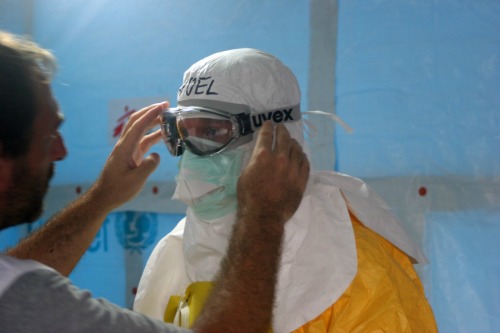
World news cycles through our Facebook feeds, blogrolls, and across our Television screens at lightning speed these days. Just four weeks ago most of our nation was riveted by the play by play updates about Ebola, and it was impossible to escape the news. Was Ebola coming to the US? Would there be a domestic outbreak? Did the CDC make the right calls once it was here? Were the health workers who contracted the disease while risking their lives treating those struggling going to survive? Should there be a travel ban? Would there be a vaccine? Ebola was everywhere! Then, even before the last American infected left the hospital a healthy man, Ebola all but disappeared from the news.
But here is the thing, Ebola itself did not disappear at all. Instead, it continues to threaten the lives of tens of thousands of people in West Africa and has already taken the lives of over 5,000 men, women, and children. 5000. Think about that number for a second; the reverberating loss that number represents. Thousands of spouses lost the love of their life, thousands of families lost a brother, a sister, a son, a daughter, an aunt, an uncle, a friend. Thousands of children lost their mothers or fathers or almost incomprehensibly both of their parents to this disease.
It is not stopping. It is not slowing down. It is only getting worse.
People are dying in the streets while they wait for treatment. There are not enough beds for the sick, supplies for the clinics, or medical professionals on the ground to gain control of the situation. They need our help, and they need it now.
The founding members of WGIRLS INC, each thankful for the opportunities their respective upbringings provided, came together to create a way for women to express that gratitude through service to those less fortunate. We create and deliver programming and fundraising initiatives that support access to safe housing, creature comforts, medical care, education, and career opportunity for those less fortunate. While WGIRLS chapters focus primarily upon efforts in their respective local communities, in times of international crisis, we come together to raise awareness and funding for those in need wherever that need may be.
This holiday season, many of us will gather around tables to give thanks for our blessings, spend time laughing and sharing with friends and family and exchanging gifts with our loved ones. At the same time, however, some of our brothers and sisters in West Africa will be desperately seeking medical care to survive. For them there will be no hugs or loved ones surrounding them. There will be no celebrations or laughter, but there is an opportunity for a gift. The gift of a fighting chance against Ebola.
Doctors without Borders, the premier organization in the fight against the disease is in desperate need of additional funding. As one of the few non-governmental organizations treating Ebola in West Africa their resources have been stretched to the limit attempting to treat the sick and control the disease.
A gift of your support will help provide the funding needed for additional medical personnel, treatments, beds, tents, and medical supplies.
Most importantly, your gift will give hope to the thousands of families impacted by this deadly disease.
Thank you in advance for joining us in the fight! Happy Holidays to you and yours!
You can DONATE HERE this #GivingTuesday.
This is an original post written for World Moms Blog by Amy Heller of WGirls in New York, USA.
Photo: Médecins Sans Frontières and American CDC staff preparing to enter an Ebola treatment unit in Liberia via wikipedia
World Moms Blog is an award winning website which writes from over 30 countries on the topics of motherhood, culture, human rights and social good. Over 70 international contributors share their stories from around the globe, bonded by the common thread of motherhood and wanting a better world for their children.
World Moms Blog was listed by Forbes Woman as one of the "Best 100 Websites for Women 2012 & 2013" and also called a "must read" by the NY Times Motherlode in 2013. Our Senior Editor in India, Purnima Ramakrishnan, was awarded the BlogHer International Activist Award in 2013.
More Posts
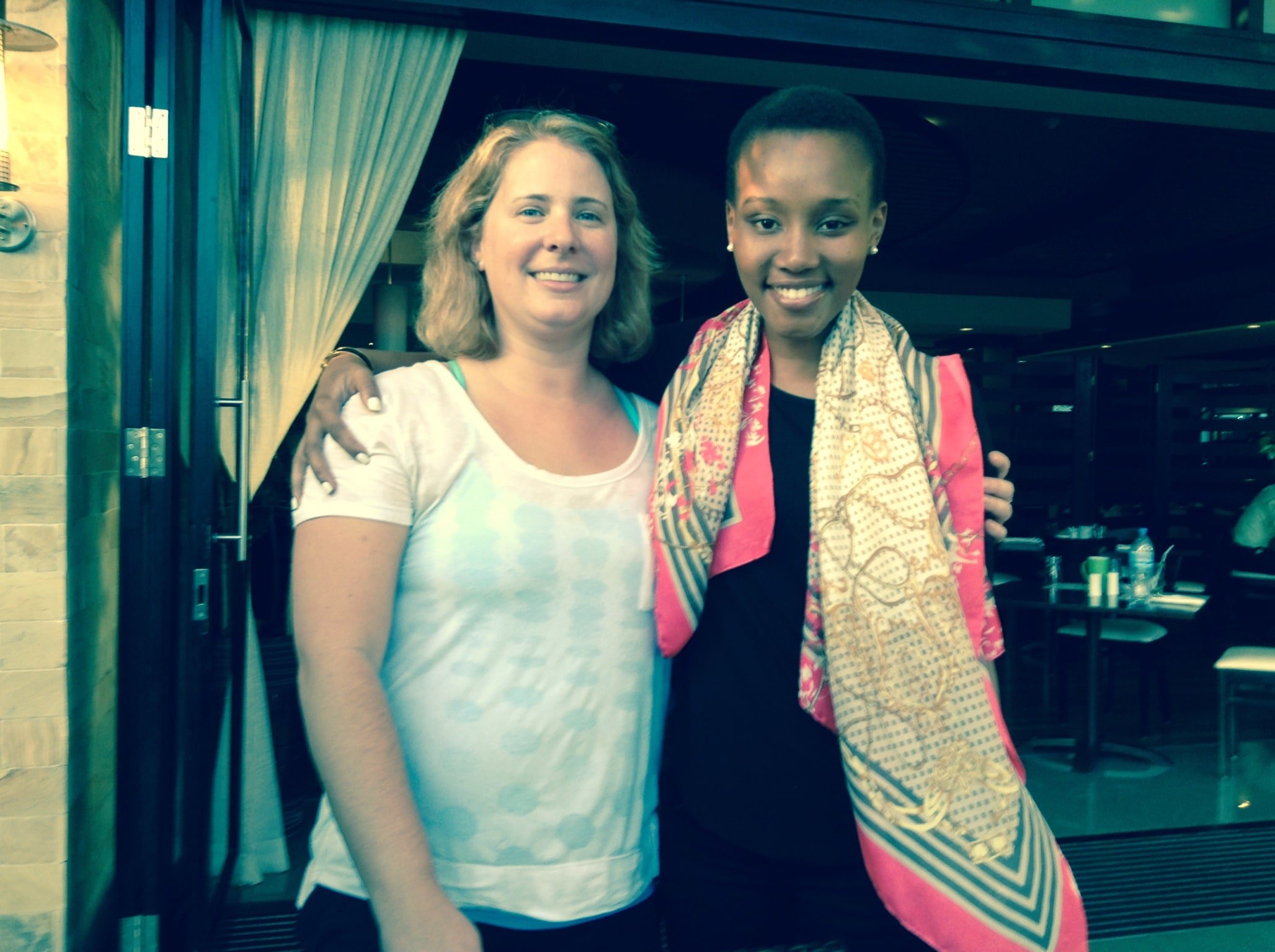
by Alison Fraser | Dec 1, 2014 | Africa, AIDS, Canada, Family, Health, Human Rights, Humanity, Nancy Sumari, ONE, Social Good, World Voice
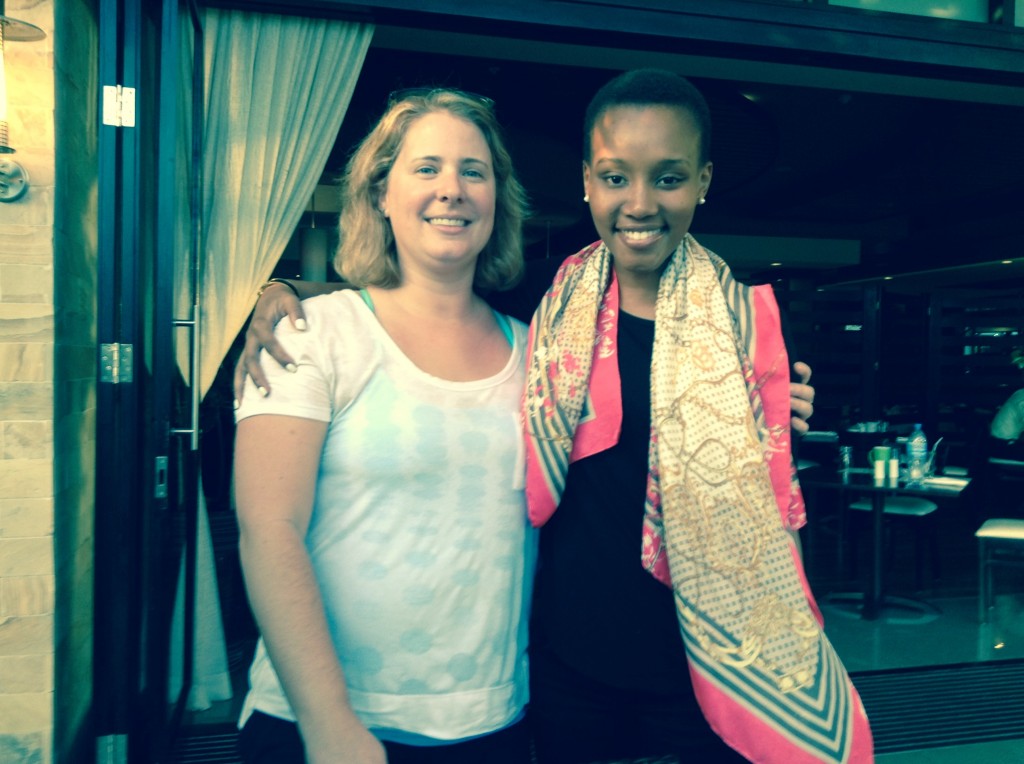
I am by no means an expert on HIV or AIDS. In fact, other than knowing some basic statistics and facts on transmission, I have never really given much thought to the social implications of living with the virus. This wasn’t intentional, but most likely the result of the small bubble in which I was living for most of my life; a bubble that did not include any friends or family directly affected by the virus. That all changed, last November, when I visited Arusha, Tanzania to meet some of the students in the Mom2Mom Africa Organization, a small not for profit that I founded several years before. I knew some of our students came from families in which some members were positive. Some were left orphaned by the disease. But what I didn’t realize was how this impacted these children in terms of treatment by their local community, regardless of their HIV status. I learned of children who were shunned by the church because the deaths of their parents was attributed to AIDS. I learned of other families shunned by their own relatives for the same reason. In some instances, the children were not even aware of why their parents died. It was hidden to protect them.
I left Tanzania with a heavy heart, but it was made heavier by the stories of the struggles of some of our students because of the AIDS pandemic. I had suspected that discrimination existed but I now had little faces associated with that discrimination haunting me, making it more real. Students are accepted into Mom2Mom Africa regardless of HIV status…I can think of operating no other way. In fact, we only request medical information so we can provide the appropriate health care.
I was now beginning to understand that this virus was not only killing people, but leaving behind families to deal with the shameful treatment by society.
Our affected students not only required extra medical attention, but also more emotional support.
I began to wonder if those affected by HIV/AIDS in Canada feel the same degree of isolation. Did being HIV positive in Canada carry with it the same stigma as in Tanzania? I decided to find out. Speaking to the AIDS Committee of Cambridge, Kitchener, Waterloo & Area (ACCKWA), I learned that, unfortunately, Canadians often face the same discrimination and stigma. Although laws are in place to help prevent discrimination, it still occurs. Many of those affected by HIV are judged, and often blamed for their HIV status. Thankfully, there are support groups such as the ACCKWA that provide a safe place and much-needed services to those living with HIV in our local community.
After speaking to ACCKWA, I contacted my friend, and fellow World Moms Blog contributor, Nancy Sumari to discuss what support services are in place for those living with HIV, and their families, in Tanzania. Nancy is part of the “I am Positive” Campaign in Tanzania. The campaign was established in response to reports by those living with HIV of being discriminated against and, in some cases, being physically assaulted and emotionally abused because of their HIV status. The campaign has several main objectives, but the one that hit home the most was:
“To live with HIV/AIDS is NOT to live without human rights and dignity”.
The power of that message is not only incredible, but universal. Regardless of what country you live in, what part of the world you live in, and what your HIV status is, you have the right to basic human rights and to live with dignity. We ALL deserve this.
As I reflect on this past year, and what I have learned about the realities those living with HIV face each and every day, I can’t help but dream of a day when the stigma no longer exists; a day when judgement and discrimination are replaced with support and understanding. Or better yet, I dream of a day when HIV and AIDS move from pandemic status to curable infection. But, until then, I hope that empathy prevails for all those living with HIV, as well as for their families.
This is an original post written by Alison Fraser for World Moms Blog.
Alison Fraser is the mother of three young girls ranging in age from 5 to 9 years old. She lives with her family in Cambridge, Ontario, Canada. Alison works as an Environmental Toxicologist with a human environment consulting company and is an active member of the Society of Environmental Toxicology and Chemistry (SETAC). She is also the founder and director of the Canadian Not for Profit Organization, Mom2Mom Africa, which serves to fund the school fees of children and young women in rural Tanzania. Recently recognized and awarded a "Women of Waterloo Region" award, Alison is very involved in charitable events within her community including Christmas Toy and School Backpack Drives for the local foodbank.
More Posts - Website
Follow Me:


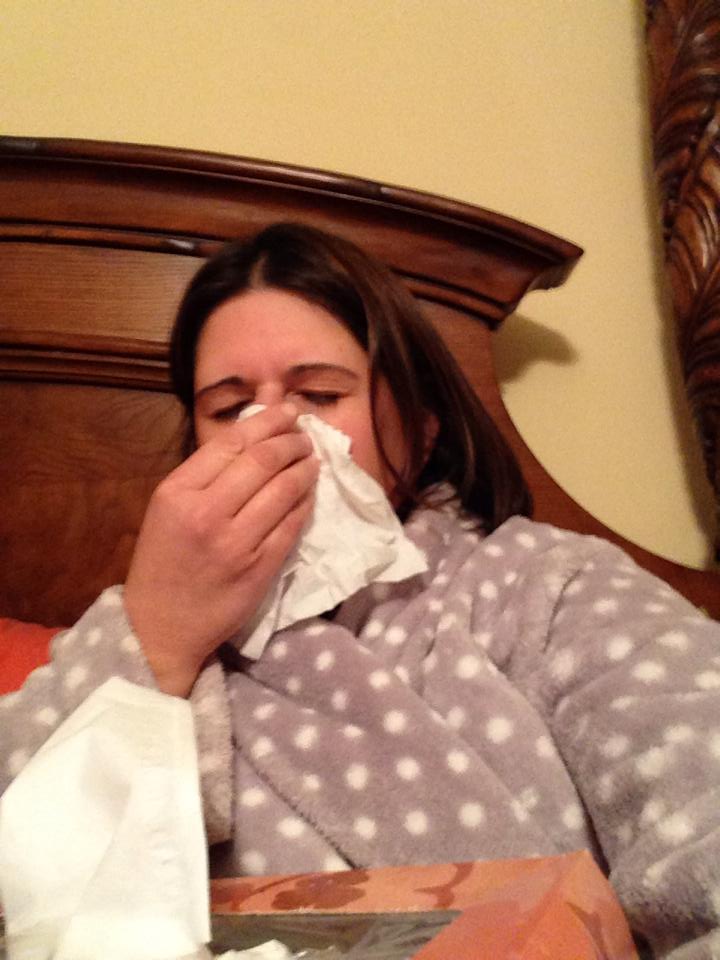
by Nicole Melancon (USA) | Nov 18, 2014 | Family, Health, Social Media, Third Eye Mom
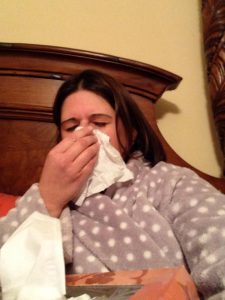 As a mother of two, I always take the necessary precautions to ensure that my children are happy and healthy. As a family, we eat healthy food, get lots of exercise and sleep and every fall we get our flu shot. There is a lot of debate and myths regarding the pros and cons of getting the flu vaccine and surprisingly only 50% of Americans get vaccinated against the flu every year. It shocks me because getting vaccinated not only keeps you protected against getting a severe, life-threatening form of the flu, it also provides protection against passing it on to someone else who may not be so lucky.
As a mother of two, I always take the necessary precautions to ensure that my children are happy and healthy. As a family, we eat healthy food, get lots of exercise and sleep and every fall we get our flu shot. There is a lot of debate and myths regarding the pros and cons of getting the flu vaccine and surprisingly only 50% of Americans get vaccinated against the flu every year. It shocks me because getting vaccinated not only keeps you protected against getting a severe, life-threatening form of the flu, it also provides protection against passing it on to someone else who may not be so lucky.
Per the World Health Organization:
Although difficult to assess, annual flu epidemics are thought to result in between three and five million cases of severe illness and between 250,000 and 500,000 deaths every year around the world. Most deaths currently associated with influenza in industrialized countries occur among the elderly over 65 years of age.
On average, 20,000 people die in the United States each year due to complications from the flu. While some years the flu deaths are much less severe – only a few thousand – other years as many as 40,000 Americans die. Where the world is utterly obsessed with the thought of getting ebola in which there is currently no vaccine, millions do not get the flu vaccine which can save lives.
I am such a strong supporter of the flu vaccine but understand that there are many people out there who believe false myths or don’t fully understand the benefits of getting yourself and your family vaccinated each year. Last week, I had the honor of speaking with Dr. Leonard Friedland an expert on infectious diseases and immunization. He is a licensed pediatrician and former Division Chief for Pediatric Emergency Medicine at Temple University School of Medicine.
Here are some of the facts and myths of the flu vaccine and why it should matter to you and your family (all facts provided by the CDC):
What exactly is the flu?
The seasonal flu is a contagious respiratory illness caused by flu viruses. It spreads between people and can cause mild to severe illness. In some cases, the flu can lead to death. In the United States, flu season occurs in the fall and winter. Seasonal flu activity usually peaks in January or February, but it can occur as early as October and as late as May.
How is the flu spread?
Most experts believe that you get the flu when a person with the flu coughs, sneezes, or talks and droplets containing their germs land in your mouth or nose. You can also get the flu by touching a surface or object that has the flu virus on it and then touching your mouth, eyes, or nose.
Is the flu different than a cold?
Yes, the flu is much more series than a common cold and extremely contagious. A flu usually involves the following symptoms:
- Fever* or feeling feverish/chills
- Cough
- Sore throat
- Runny or stuffy nose
- Muscle or body aches
- Headaches
- Fatigue (tiredness)
- Some people may have vomiting and diarrhea, though this is more common in children than adults.
* It’s important to note that not everyone with flu will have a fever.
What are the negative consequences of getting the flu?
Flu is a severe infection. If you have ever had full-blown influenza (like I did several years ago) it is absolutely miserable and can be extremely serious. Hundreds of thousands of people are hospitalized each year due to complications of the flu and unfortunately thousands die. The flu also causes many work and school days missed. The WHO estimates that recent estimates put the cost of influenza epidemics to the economy at US$ 71-167 billion per year in the United States alone.
Who needs to get vaccinated?
The U.S. Centers for Disease Control and Prevention (CDC) recommends that almost everyone six months and older get a flu vaccination each year. It is important to note that even if you are healthy you should get a vaccine.
Seniors (over 65) are especially encouraged to get a flu vaccine every year since people over 65 make up 90% of all deaths due to complications from the flu. Pregnant mothers, children under five years of age (and over 6 months) and anyone with a comprised immune system and/or other medical conditions is highly encouraged to get vaccinated.
What are some of the misperception regarding the flu vaccine?
- A common misperception is that the flu is just like having a cold. This is not true as the flu can become much more serious and cause death.
- Belief that the flu vaccine itself can cause flu. FALSE.
Per the CDC:
A flu vaccine cannot cause flu illness. Flu vaccines that are administered with a needle are currently made in two ways: the vaccine is made either with a) flu vaccine viruses that have been ‘inactivated’ and are therefore not infectious, or b) with no flu vaccine viruses at all (which is the case for recombinant influenza vaccine). The nasal spray flu vaccine does contain live viruses. However, the viruses are attenuated (weakened), and therefore cannot cause flu illness. The weakened viruses are cold-adapted, which means they are designed to only cause infection at the cooler temperatures found within the nose. The viruses cannot infect the lungs or other areas where warmer temperatures exist.
While a flu vaccine cannot give you flu illness, there are different side effects that may be associated with getting a flu shot or a nasal spray flu vaccine. These side effects are mild and short-lasting, especially when compared to symptoms of bad case of flu (For flu shot, side effects may include soreness, redness, or swelling where the shot was given, low-grade favor and or aches. For the nasal spray, side effects from the nasal spray may include runny nose, wheezing, headache, committing, muscle aches, fever).
- It is also important to note that the flu vaccine can take up to two weeks to be fully effective meaning that a person may come down with the flu during that time period or even get a cold and mistakenly believe it is from receiving the flu shot.
I got the flu vaccine but still got influenza? Did the flu vaccine not work?
It is important to note that each year, flu vaccines are made months before flu season each year based on scientific research that determines what strains are most prevalent. Therefore, the flu vaccine is not 100% effective against all strains of the flu. However, it is still highly recommended that you get vaccinated each year because if you do get the flu, it is most likely will be a much less severe form that if you had not been vaccinated at all.
I am not convinced that I should get the flu vaccine. I never get sick.
As a society, I believe it is important to think of everyone else around us. The flu is highly contagious and even if you don’t mind getting miserably sick, how would you feel if you passed it onto a child, a senior or someone with a comprised immune system who dies from it? I personally could never live with that myself.
Can I still get vaccinated?
Yes! The flu season is just beginning and there is still time to get you and your family vaccinated. Most pharmacies, health clinics and doctors offices provide the flu shot and mist. Go to www.flu.gov to find the clinic nearest you.
Want to learn more?
Check out the CDC website for more information on the flu by clicking here. You can also go to www.flu.gov to track where the flu has hit, where to get vaccinated and any additional facts you would like to know.
The bottom line: The single best thing we can do to protect our family and other people is to get vaccinated!
Additional stats from the CDC:
- A recent study* showed that flu vaccine reduced children’s risk of flu-related pediatric intensive care unit (PICU) admission by 74% during flu seasons from 2010-2012.
- One study showed that flu vaccination was associated with a 71% reduction in flu-related hospitalizations among adults of all ages and a 77% reduction among adults 50 years of age and older during the 2011-2012 flu season.
- Flu vaccination is an important preventive tool for people with chronic health conditions. Vaccination was associated with lower rates of some cardiac events among people with heart disease, especially among those who had had a cardiac event in the past year. Flu vaccination also has been shown to be associated with reduced hospitalizations among people with diabetes (79%) and chronic lung disease (52%).
- Vaccination helps protect women during pregnancy and their babies for up to 6 months after they are born. One study showed that giving flu vaccine to pregnant women was 92% effective in preventing hospitalization of infants for flu.
- Other studies have shown that vaccination can reduce the risk of flu-related hospitalizations in older adults. A study that looked at flu vaccine effectiveness over the course of three flu seasons estimated that flu vaccination lowered the risk of hospitalizations by 61% in people 50 years of age and older.
Did you get your flu shot?
This is an original post written for World Moms Blog by Nicole Melancon of Third Eye Mom.

Third Eye Mom is a stay-at-home mom living in Minneapolis, Minnesota with her two children Max (6) and Sophia (4). Her children keep her continually busy and she is constantly amazed by the imagination, energy and joy of life that they possess! A world wanderer at heart, she has also been fortunate to have visited over 30 countries by either traveling, working, studying or volunteering and she continues to keep on the traveling path.
A graduate of French and International Relations from the University of Wisconsin Madison, where she met her husband Paul, she has always been a Midwest gal living in Minnesota, Wisconsin and Chicago. This adventurous mom loves to be outside doing anything athletic (hiking, running, biking, skiing, snowshoeing or simply enjoying nature), to travel and volunteer abroad, to write, and to spend time with her beloved family and friends.
Her latest venture involves her dream to raise enough money on her own to build and open a brand-new school in rural Nepal, and to teach her children to live compassionately, open-minded lives that understand different cultures and the importance of giving back to those in need. Third Eye Mom believes strongly in the value of making a difference in the world, no matter how small it may be. If there is a will, there is a way, and that anything is possible (as long as you set your heart and mind to it!).
Visit her on her blog, Thirdeyemom, where she writes about her travels and experiences in other lands!
More Posts

by Karien Potgieter | Nov 5, 2014 | 2014, Africa, Being Thankful, Exercise, Family, Health, Kids, Life Balance, Motherhood, Nutrition, Parenting, Priorities, Running, Siblings, South Africa, Working Mother, World Moms Blog Writer Interview, World Motherhood, Writing
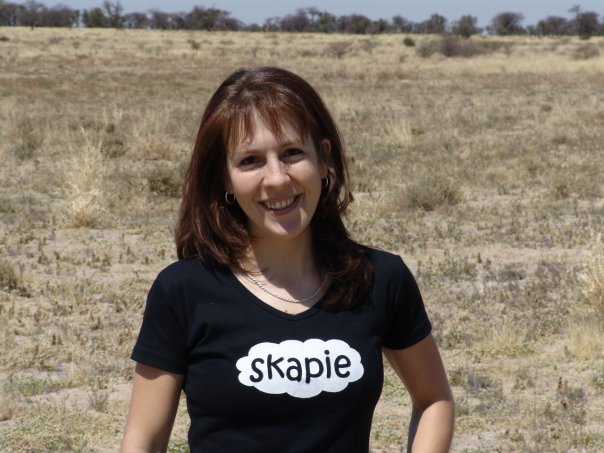 Where in the world do you live? And, are you from there?
Where in the world do you live? And, are you from there?
I live in Kimberley, the diamond capital of South Africa. Kimberley is a smallish, dusty town that gets extremely hot in summer – living here sometimes requires a good sense of humour, ha! I was born and raised just a short distance from here – in Bloemfontein in Central South Africa.
What language(s) do you speak?
Our home language is Afrikaans, but I’m fluent in English as well. South Africa has 11 official languages, plus a number of unofficial ones, so I’m really far behind as far as that goes!
When did you first become a mother?
I was blessed with a beautiful, peaceful little girl at the beginning of 2012 at the age of 34. My son, a busy, happy little guy, was born 22 months later at the end of 2013. It’s been an overwhelming, busy and blessed two-and-a-half years – what an amazing adventure!
Is your work: stay-at-home mom, other work at home or do you work outside the home?
I’m in the very privileged position to work from home as an ecologist. I feel extremely blessed to be able to be here for my kids all day (we have a nanny who looks after them while I work) and be able to do a job that I love.
Why do you blog/write?
Writing is my passion – I love, love, love it! Combining writing with my other passions, namely my kids, running and healthy living, is pure bliss.
How would you say that you are different from other mothers?
I’m quite a health nut! At the age of two-and-a-half my daughter has never seen or tasted something like a soda and very rarely eats junk food – we just don’t keep it in our house. She and her brother both love fruits and veggies – perhaps because it’s all they know? I also love running with both kids in our double jogging stroller – it’s one of our favourite things to do!
What do you view as the challenges of raising a child in today’s world?
There are so many! Keeping them safe in a country known for its high crime rate; teaching them to value and accept themselves in a society where pressure is immense to be and look a certain way; teaching them to respect others in a world where respect for others is on the decline; teaching them to be active and take care of their bodies in a world where technology makes everything so easy… The list goes on and on. Only by grace!
How did you find World Moms Blog?
I love reading about other mothers’ experiences on this crazy adventure called motherhood. An online search led me to World Moms Blogs, where I’ve found so many inspirational stories about moms from all over the globe – I love it!
This is an original, interview post for World Moms Blog from our new writer in South Africa and mum of 2, Karien Potgieter. You can read more about Karien’s running adventures through life at her personal blog: Running the Race
Karien Potgieter is a full-time working mom of two toddlers. She has a master’s degree in ecology and works in the conservation sector in beautiful South Africa. Her other big passion, apart from her family and caring for the environment, is running. To date she’s participated in races on three continents and in six countries and she dreams of travelling to and running in many, many more. You can follow her and her family’s running adventures on her blog, Running the Race (http://www.runningtherace.co.za).
More Posts - Website
Follow Me:





by Tina Marie Ernspiker | Oct 31, 2014 | 2014, Health, Home, Husband, International, Kids, Life Balance, Living Abroad, Mexico, Motherhood, Moving, Travel, World Motherhood
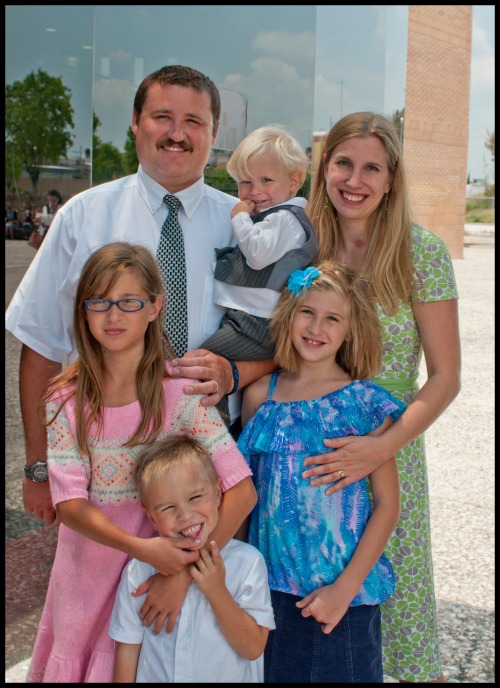 “I was not born for one corner; the whole world is my native land.” -Seneca
“I was not born for one corner; the whole world is my native land.” -Seneca
I don’t just believe this quote. I feel it. I am in love with our beautiful planet. The world is a gift filled with life, adventure, and beauty. Wonderful things await those who are willing to travel and experience this gift firsthand. I want these things for my children. I want them to have friends in every land and favorite places across the sea; to taste new flavors, see new sights, and hear new sounds; to know that this world was made for them, borders can be crossed, different is good, and change can open up doors. I want to broaden their horizons and open their minds to this gift, this world… our native land. (more…)




















 “I was not born for one corner; the whole world is my native land.” -Seneca
“I was not born for one corner; the whole world is my native land.” -Seneca


